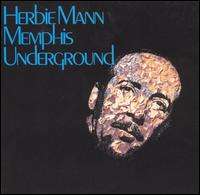Memphis Underground
| Memphis Underground | ||||
|---|---|---|---|---|
 | ||||
| Studio album by Herbie Mann | ||||
| Released | 1969 | |||
| Genre | Crossover Jazz, Soul Jazz | |||
| Label | Atlantic | |||
| Producer | Tom Dowd | |||
| Herbie Mann chronology | ||||
| ||||
| Professional ratings | |
|---|---|
| Review scores | |
| Source | Rating |
| Allmusic | |
| Rolling Stone | favorable[2] |
| The Rolling Stone Jazz Record Guide | |
Memphis Underground is a 1969 album by jazz flautist Herbie Mann, that fuses the genres of Jazz and Rhythm & Blues (R&B). While Mann and the other principal soloists (Roy Ayers, Larry Coryell and Sonny Sharrock) were leading jazz musicians, the album was recorded in Chips Moman's American Studios in Memphis, a studio used by many well-known R&B and pop artists. The rhythm section was the house band at American Studios. The recording was engineered and produced by Tom Dowd.
Three of the five songs on the album were covers of songs originally released by Soul music artists. "Hold On, I'm Comin'" (by Sam & Dave), who recorded at Stax records (with the Stax rhythm section), and "Chain of Fools" (by Aretha Franklin) who recorded that song with the classic Muscle Shoals Rhythm Section at Atlantic Studios in New York.
Two members of the rhythm section on Franklin's recording (Gene Christman and Tommy Cogbill) perform on Memphis Underground.[4]
A third song, "New Orleans", was also released by R&B artist (Gary U.S. Bonds), who recorded in Virginia.
So though the only one song was certifiably of Memphis vintage, the conglomeration of young New York jazz musicians with one of the most storied Southern rhythm sections proved to be the catalyst for creating strong, fresh music that sounds like neither Memphis Soul nor New York Jazz. This unique sound appealed to a large audience.
Reception
The record is one of the best-selling Jazz albums of all time. Rolling Stone said "Memphis Underground is a piece of musical alchemy, a marvelously intricate combination of the "Memphis sound" and jazz lyricism".[5]
Memphis Underground was a favorite album of writer Hunter S. Thompson, who mentions it positively in several chapters of his book Fear and Loathing on the Campaign Trail. In the article The Battle of Aspen, Thompson states that his "Freak Power" campaign used Mann's recording of "Battle Hymn of the Republic" as the background music for their commercials.
Another writer, the British author Stewart Home, as a tribute to this Mann album, titled his 2007 novel (some call it an antinovel) Memphis Underground. In the novel, Home makes multiple references to soul, northern soul and jazz soul music.
Track listing
- "Memphis Underground" (Herbie Mann) — 7:07
- "New Orleans" (Frank Guida, Joseph Royster) — 2:07
- "Hold On, I'm Comin'" (Isaac Hayes, David Porter) — 8:52
- "Chain of Fools" (Don Covay) — 10:42
- "Battle Hymn of the Republic" (Traditional, arranged by Herbie Mann) — 7:12
Personnel
- Herbie Mann – flute
- Roy Ayers – vibes, conga on "Battle Hymn of the Republic"
- Larry Coryell – guitar
- Sonny Sharrock – guitar
- Miroslav Vitouš - "Fender bass" on "Hold On, I'm Comin'"
- Reggie Young – guitar
- Bobby Emmons – organ
- Bobby Wood – electric and acoustic piano
- Gene Chrisman – drums
- Tommy Cogbill or Mike Leech - "Fender bass" (individual tracks not specified)
Note: The "Fender bass" mentioned on the album's credits is a slang term for "bass guitar", commonly used by musicians, arrangers and producers in the 1950s and 1960s. It was used to specify that an electric bass (as opposed to an acoustic instrument) was desired for a session. The word "Fender" refers to the creator of the first mass-produced instrument, Leo Fender, but does not necessarily mean that an instrument manufactured by the Fender company was used on the session.
- Tom Dowd – Producer and engineer
- Joel Brodsky – Cover photo
- William Albert Allard – Back liner photo
Renditions
In 1993, flautist Alexander Zonjic covered the song from his album "Passion."[6]
See also
References
- ↑ Allmusic review
- ↑ Winner, Langdon (12 July 1969). "Records". Rolling Stone (San Francisco: Straight Arrow Publishers, Inc.) (37): 36.
- ↑ Swenson, J. (Editor) (1985). The Rolling Stone Jazz Record Guide. USA: Random House/Rolling Stone. p. 130. ISBN 0-394-72643-X.
- ↑ Lady Soul Lady Soul album, by Aretha Franklin
- ↑ Winner, L., Rolling Stone, July 12, 1969, p.38
- ↑ "Passion overview". Allmusic.com.
| ||||||||||||||||||||||||||||||